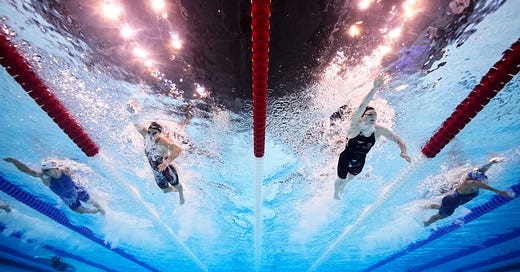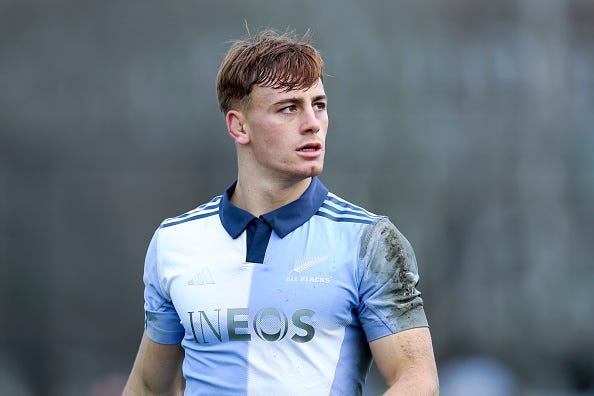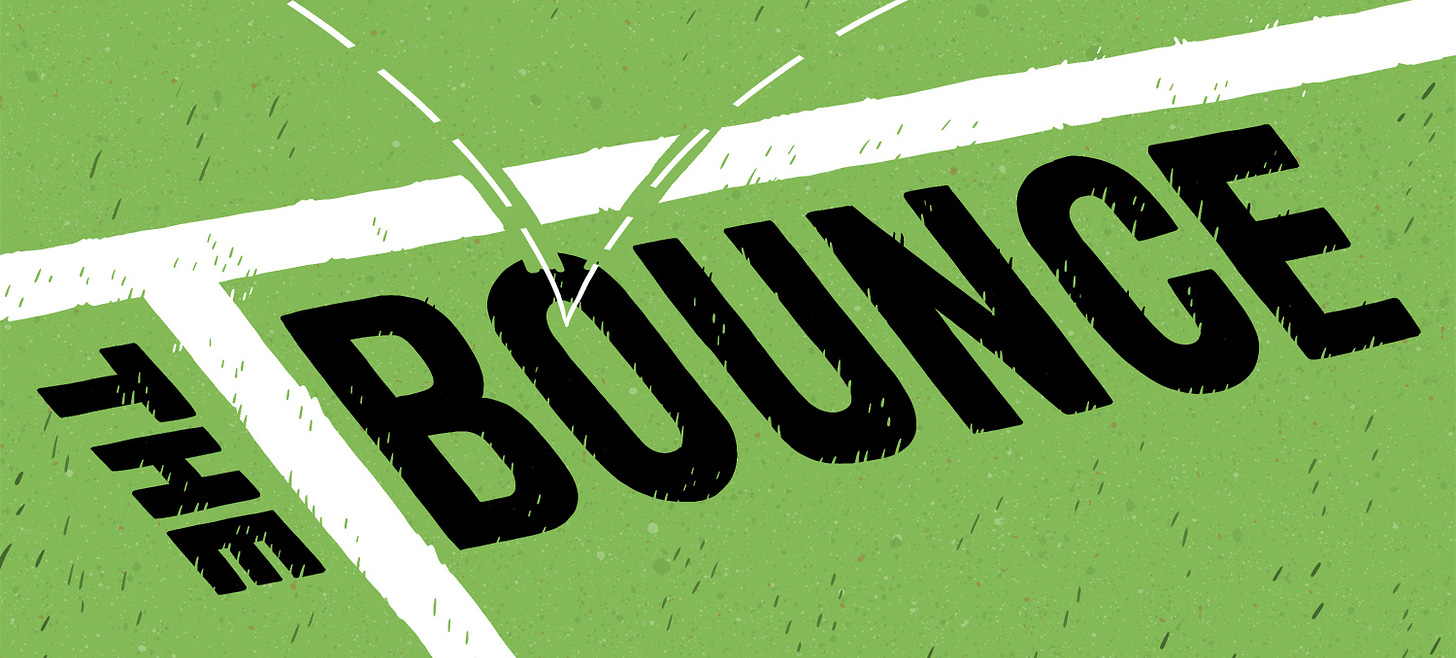Olympique Daily: Like chasing a mirage
For NZ swimming, the wall remains just out of reach, PLUS: Hockey misfortune, some cycling and a bit of oval-ball news.
A newsletter that is definitely Olympic, but not really “daily”.
A couple of ridiculously late nights in the bag and I don’t think it’s unfair to label New Zealand’s collective start to Paris 2024 as “mixed”. Or, to put it another way, if thieves were to break into the New Zealand Olympic Committee compound in search of medals, they would be leaving with wallets and iPhones instead.
Slow starts and New Zealand Olympic campaigns are familiar bedfellows. As a proud Olympic nation, we tend to rise late and start to stretch our wings when the rowing finals kick off later in the first week, while hoping to pick up the odd trinket on horseback, the sevens or triathlon in the meantime.
And of course, there’s the swimming.
I have to confess to a dark curiosity about this country’s futility when it comes to competing in H2O without the aid of a vessel. We’re a country that loves to talk about punching above our per capita weight class, but if swimming success was a barometer of sporting prowess, we would not view ourselves so smugly.
A New Zealand woman hasn’t won a medal in the pool since 1952 — that’s quite a while — and the last New Zealander to win anything in the pool was Danyon Loader in 1996.
Let’s break that down for a short minute.
This century the NZOC and Swimming New Zealand have sent swim teams totalling 76 spots made up of 56 athletes (several have been to multiple games) to the Olympics. The largest team was the 16 sent to London, the smallest the seven who went to Tokyo.
Those athletes have competed across 106 separate events in the pool and have made, wait for it… 11 finals. That’s a ‘success’ rate, give or take a few decimal points, of a final made for every ten events entered.
In Sydney and Athens no finals were reached, while in Rio de Janeiro only Kane Radford swam in a final, though there were no heats and semis for his open-water event.
I’ve had spirited conversations with people who like to point out that swimming is a huge sport dominated by the USA and Australia, so securing medals is much tougher than it is, for example, in sports like rowing and sevens.
This is unquestionably true, but so is the following list of countries that have won at least one medal in the pool this century: Argentina, Australia, Austria, Belarus, Belgium, Brazil, Canada, China, Costa Rica, Croatia, Denmark, Finland, France, Germany, Great Britain, Greece, Hong Kong, Hungary, Italy, Japan, Kazakhstan, Lithuania, Netherlands, Norway, Poland, Romania, Russia, Serbia, Singapore, Slovakia, Slovenia, South Africa, South Korea, Spain, Sweden, Switzerland, Trinidad & Tobago, Tunisia, Ukraine, USA, Zimbabwe.
To save you counting, that’s 41 countries, and while a good eight or nine of them are noted powerhouses, you can’t look at that list and say all of those countries have better access to coaching, infrastructure and competition.
This is why I remain so fascinated by the country’s inability to medal in the pool.
It is the sheer inexplicability of it.
Paris was where the drought was going to end, with world champions Erika Fairweather and Lewis Clareburt poised to make a mark in their respective specialist 400m freestyle and 400 individual medley events.
Vague hope was replaced by expectation.
Both swam below their best (many have, including some winners, leading some to conclude it may be a ‘slow’ pool), and struggled to put a finger on why it “didn’t click” on the night in post-race interviews that were raw and in Fairweather’s case tough to watch. It would be cretinous to lay the woes of New Zealand swimming at their feet. Both have done an incredible job of boosting the sport here with their world championship gongs, but it is also hard not to see something symbolic in them reaching for the wall in Paris and the big prizes remaining just out of reach.
That is the story of New Zealand swimming — the perpetual fever dream of chasing a mirage in the desert.
Unless these two can conjure up something miraculous in their secondary events, the futility will move to Los Angeles, where it will be 76 years since Jean Stewart’s backstroke bronze, and 32 years since Loader’s freestyle double.
Until then it’s time to raise a glass of chlorinated water and embrace this incredible streak.
***
Speaking of misfortune piled upon bad luck, let’s move to hockey, where we still talk fondly of ’76, Ineson, Manning’s shattered kneecap and all that.
The Black Sticks men are 0-2 but they’ve been mostly really good in losses to India and Belgium. As the old chestnut goes, the only thing better than good is being lucky.
In the 2-3 opening loss to India they can rightfully feel aggrieved about two of India’s goals. Don’t believe me, read Selwyn Maister instead.
Vivek Sagar Prasad netted in the 34th minute but the Black Sticks claimed defender Blair Tarrant had stopped the whole ball crossing the line.
Umpire Martin Madden called for a video review, which proved inconclusive with Madden advised to uphold his on-field decision.
Madden then awarded the goal, telling Black Sticks captain Nic Woods he was convinced Prasad’s shot had crossed the line.
Maister, a four-time Olympian and a former Black Sticks women’s team assistant-coach, felt the goal had been wrongly awarded.
“I think the umpire made a mistake. They didn’t have a camera in the right place.”
The winning goal, via a penalty stroke, was even worse from my perch on the couch. First, it was a harsh call to award a penalty corner for a foul outside the circle, and an even harsher one to award the stroke, as goalkeeper Dominic Dixon’s save was taking the ball wide of the goal before it struck the New Zealand defender’s body.
Against defending champions Belgium, the Black Sticks were again hyper competitive, but lost to one of the best, most freakish goals you will see, with a reverse-hit slap taken from mid-air at an impossibly acute angle.
The Black Sticks campaign is already hanging by a thread.
***
No medals, but Sammie Maxwell, eighth in the MTB cross country, and Kim Cadzow, seventh in the time trial, put in excellent performances on their bikes.
As you might recall, Maxwell had a circuitous personal journey to Paris that involved deatils of her personal health battles becoming public and eventually a favourable Sports Tribunal decision, but she made sure she had support on the course by offering sweets to the marshals to cheer her on.
The way to a volunteer’s heart is through classic milk bottle lollies.
France’s Pauline Ferrand-Prévot made an early case for performance of the games, putting minutes between herself and her chasers at the Elancourt course.
***
The Canada football drone saga keeps taking incredible twists.
Coach Bev Priestman as spoken out in one of those mealy statements that take “full responsibility” without ever taking full responsibility. The country’s sports minister Carla Qualtrough wasn’t messing around calling it regrettable and an embarrassment to Canadian sport, before adding: “It is completely unfair to Canadian players and to opposing teams. It undermines the integrity of the game itself. Given that the women’s programme receives funding from Sport Canada, we are withholding funding relating to suspended Canada Soccer officials for the duration of their Fifa sanction.”
Canada were docked six points, fined and had three staff suspended, which was an effective death penalty to their campaign. But in a staggering twist, they beat the hosts in the 12th minute of added time last night to get back to zero points and will qualify for the knockouts if they beat Colombia.
It’ll be an amazing achievement, but one that nobody outside their close friends and family will be celebrating, despite an impassioned defence of the team’s ethics from their skipper.
In Pt 5 of K3 Legal’s “Business Toolkit” series, they discuss the force majeure clauses in business contracts and how they can protect your business by suspending obligations or exempting liabilities during events like natural disasters, wars or pandemics. Understanding these protections is critical for any business owner.
DAY 3: KIWIS IN ACTION
A relatively quiet day for the Kiwis
Shooting
7pm: Owen Robinson - trap qualification
Rowing
8.30pm: Kate Haines/ Alana Sherman - womens pair, repechage
Equestrian
9pm: Eventing team final, showjumping (Johnston, T. Price & J. Price)
1am: Clarke Johnstone, Tim Price, Jonelle Price - eventing individual final
Tennis
10pm: Erin Routliffe/ Lulu Sun - doubles
Sailing
10.03pm: Veerle ten Have - foil races 1-5
10.15pm: Jo Aleh/ Molly Meech - 49er FX races 4-6
10.23pm: Josh Armit - foil races 1-5
Cycling
12.10am: Sam Gaze - MTB cross country
Sevens
2.30am: NZ v Fiji (pool)
7-8.30am: quarter-finals
Swimming
7.48am: Erika Fairweather - 200m freestyle final
A quick non-Olympic detour
Never before has an All Blacks team naming been so lost in the fog. There were three points of interest in the 36-man squad for the Rugby Championship:
The decision to add Love to the squad means the All Blacks have four players capable of playing fullback in Beauden Barrett, Stephen Perofeta, Jordan and Love.
Love was excellent for the Hurricanes in Super Rugby Pacific, and considered unlucky not to be included in the first squad of the year.
His ability to take the high ball and willingness to counter-attack under pressure makes him a potent weapon from the back…
Scott Robertson: “It will be a special moment for Ruben being selected for the first time. He’s worked hard in the background and will be ready when his opportunity comes.”
The recall to the All Blacks wasn’t something that had been planned from the start of the season, though.
“[Robertson] said it’s going to come down to the makeup of the squad. He was honest that it was going to depend on that and my focus is just to get back fit and available. I certainly wasn’t expecting to get named, and that if I was named it'd be a bonus. If not, I’d be spending the season with BoP.”
Christie, who was a regular pick in the previous regime, didn’t so much play his way out of the Rugby Championship squad as Hotham played his way in.
Hotham, who was called in after the first test against England as injury cover for TJ Perenara, made a sparkling debut in San Diego in which he signalled he has both the mental and physical capacity to thrive in test rugby.
It was obviously enough, combined with two relatively so-so performances from Christie in which he never quite ignited the All Blacks attack or played with the sort of free-flowing dynamism a continuity game plan needs, to convince Robertson to make what is a significant change to the halfback pecking order.
Coming into the first test of the year, it was apparent that Perenara ranked one, Christie two and Cortez Ratima three.
Now, the evidence would suggest that Hotham has leapt to number three, Christie is demoted to four and possibly what may be confirmed when the team to play Argentina is picked, is that Ratima is now number one and Perenara two.
And given the clinical way Christie was released after not quite delivering, there will be some interest seeing what happens when Cam Roigard returns from injury later this year.
Barrett probably starts against Argentina in Wellington on August 10 — or he has earned the right to, anyway. Barrett shored up the All Blacks’ defensive effort against England off the bench in Dunedin and at Eden Park he changed the game from an attacking perspective.
It still strikes as slightly odd that the selectors went with Stephen Perofeta as the starting fullback for both of those tests, given Barrett’s quality and experience (he has now played 126 Tests). In fairness, though, Perofeta played well in both. He wasn’t required for the Fiji test in San Diego, with Barrett starting there. The experience should be hugely beneficial to the versatile Perofeta, who has now played five tests.
A complicating factor, of course, is the imminent return of Will Jordan, named in the All Blacks’ extended Rugby Championship squad of 36 on Sunday.
I didn’t watch the Warriors live and was warned in advance by several concerned friends that catching up with the win against the hapless Tigers later would be 90 minutes of my life that I would never get back… the warnings were well intentioned and should probably have been listened to.
Still, they’re alive! Still, they’re selling out!
The New Zealand Warriors have become the first club in NRL history to complete a grand slam of sold-out home games in a season. With the last few remaining tickets sold for the final two matches against Parramatta and Canterbury Bankstown, the Warriors have completed a perfect record of selling out all 10 games at Go Media Stadium this year, plus their home against Canberra in Christchurch.
That is actually dead set impressive, even if that’s not a word you can apply to the Warriors’ performances this season.








I love the Olympics - just a constant mix of unfamiliar sports to learn about! Nice to have other sports that hog winters attention to be on the back-burner.
The second Belgian goal was one of the most insane pieces of skill I've ever seen. To trap the ball mid air on the reverse stick side, hit it while it's still in the air and again reverse it into the bottom corner with the narrowest of gaps past the goalie's pads, I don't think there's words to describe how incredible that was. Don't think I've ever seen a better goal in any sports involving a ball and a target. Not much luck went our way, we looked a really well-coached, skillful outfit.